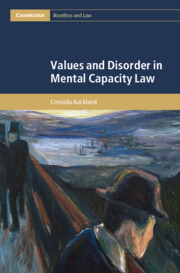Book contents
- Values and Disorder in Mental Capacity Law
- Cambridge Bioethics and Law
- Values and Disorder in Mental Capacity Law
- Copyright page
- Dedication
- Contents
- Acknowledgements
- Cases
- Statutes
- Introduction
- 1 A Value-Neutral Understanding of Capacity
- 2 An Essential Role for Values in Assessments of Capacity
- 3 Why Disorder Matters
- 4 Accommodating Values in the Test of Capacity
- 5 Reflecting Ambiguity on the Cusp of Capacity
- 6 Softening the Capacity Cliff Edge
- Conclusion
- Appendices
- Book part
- Bibliography
- Index
- Cambridge Bioethics and Law
- References
Bibliography
Published online by Cambridge University Press: 25 October 2024
- Values and Disorder in Mental Capacity Law
- Cambridge Bioethics and Law
- Values and Disorder in Mental Capacity Law
- Copyright page
- Dedication
- Contents
- Acknowledgements
- Cases
- Statutes
- Introduction
- 1 A Value-Neutral Understanding of Capacity
- 2 An Essential Role for Values in Assessments of Capacity
- 3 Why Disorder Matters
- 4 Accommodating Values in the Test of Capacity
- 5 Reflecting Ambiguity on the Cusp of Capacity
- 6 Softening the Capacity Cliff Edge
- Conclusion
- Appendices
- Book part
- Bibliography
- Index
- Cambridge Bioethics and Law
- References
- Type
- Chapter
- Information
- Values and Disorder in Mental Capacity Law , pp. 297 - 313Publisher: Cambridge University PressPrint publication year: 2024

